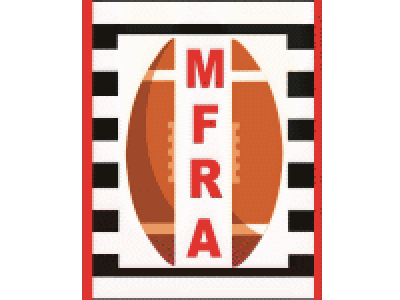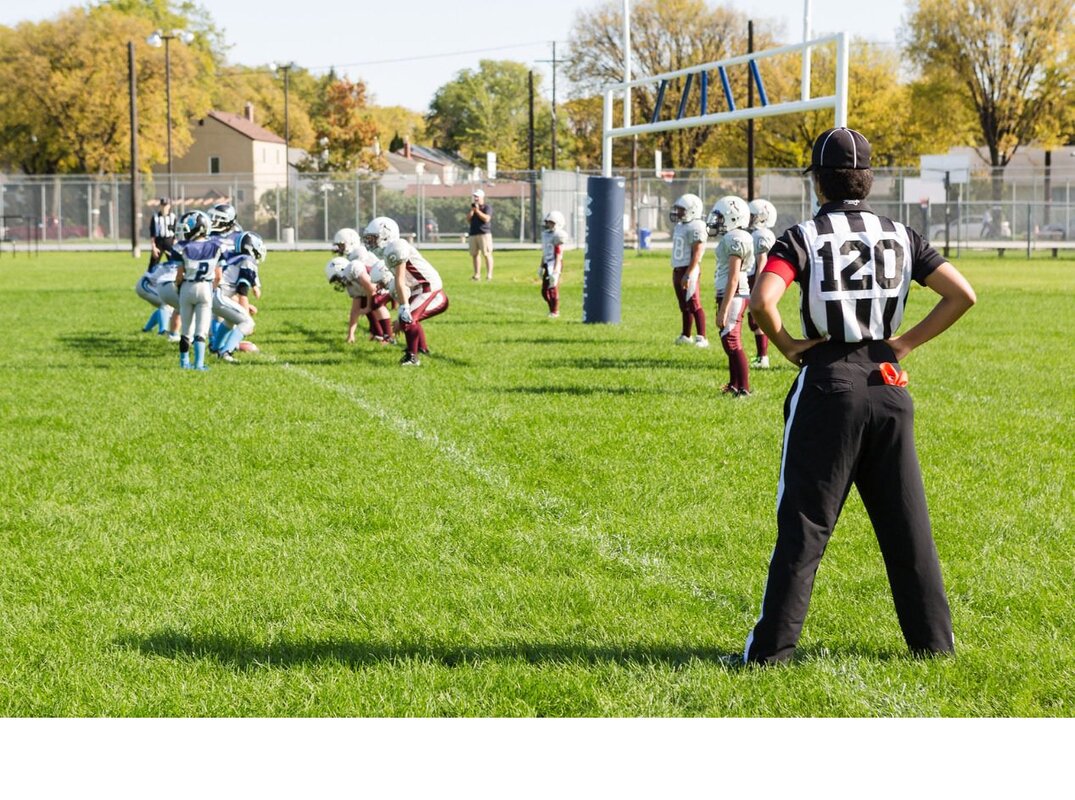Be a Ref!
As a football official, you'll have the opportunity to be right in the action, making important calls and ensuring fair play on the field. Plus, you'll get to stay active, build relationships with fellow officials and players, and contribute to the game you love.
Becoming an amateur football referee offers a unique way to stay connected to the sport while gaining valuable life skills. Whether you're a former player, coach or simply passionate about football, officiating allows you to deepen your understanding of the game and remain actively involved. It’s also a flexible and rewarding side hustle and you can choose games that fit your schedule.
Beyond the field, reffing builds confidence, sharpens decision-making, and teaches conflict resolution, all while keeping you physically active. You’ll become part of a community of players, coaches, and fellow officials, and your presence helps support youth and amateur sports. For those interested in advancing, there are clear pathways through certifications and training that can lead to higher-level opportunities. It’s a role that combines passion, purpose, and personal growth.
So why wait? Take the first step towards becoming a football official today!
Why Become a Football Official?
People choose to become football officials for a variety of reasons. Many are driven by a deep love for the sport and the satisfaction of helping young athletes develop their skills. It's also an excellent way to stay active and engage in teamwork, while also meeting diverse people from various backgrounds and experience levels. Being an official allows you to contribute to the evolution of the sport and serve players, coaches, parents, and fans. It's a role that comes with both the pleasure of officiating and the responsibility of acting professionally, both on and off the field.
Can I Become an Official Even if I've Never Played Football?
Absolutely! While prior playing experience can be beneficial, it's not a requirement. Many excellent officials have learned the sport, mastered officiating duties, and now work high-caliber games by leveraging other strengths and familiarizing themselves with the game.
What Training and Support Are Provided to New Officials?
New recruits undergo a mandatory Level One clinic, typically held on a weekend before the season. This session introduces you to the main rules and the key duties and responsibilities of a line judge. You'll also have opportunities to attend rule study sessions during the year.
During your initial games, you'll be supported by experienced colleagues who will guide you and answer your questions. A mentoring system is often in place to assist you throughout your first season. After your first season, officials are encouraged to deepen their knowledge of the rules and participate in annual training sessions to refine their expertise.
What Are the Age Requirements to Be a Football Official?
The minimum age to officiate is 14. Prerequisites include good physical condition, a certain level of maturity, and the ability to travel to various fields. There is no maximum age, but you'll need a good level of physical fitness to keep up with the pace of the game alongside young players.
What Are the Start-Up Costs?
You'll be responsible for the initial training session, which typically costs between $25 and $35. Additionally, you'll need to purchase equipment and clothing, estimated to cost around $150.
What Equipment and Clothing Will I Need to Start?
Your initial equipment includes:
- A striped official's shirt
- A black official's cap
- A whistle
- A penalty flag
- Black pants (if on-field)
You'll also need black shoes (cleated shoes, optional) which can be purchased from many retail stores or sport suppliers.
Will I Have to Spend All My Weekends on Football Fields?
Football games primarily take place on Saturdays and Sundays. Some games are played on weeknight evenings. However, you have the flexibility to decide your availability based on your schedule and commitments. Depending on the availability you indicate, you may be assigned to more or fewer games.
What Can I Expect to Earn in a Season?
Compensation for games assigned to a first-time official typically ranges between $25 and $45 per game. A rookie who quickly learns, performs well, and demonstrates strong availability might officiate between 20 and 40 games during their first season. Payments are issued at the end of the season.
Are There Opportunities for Advancement?
Yes, there are excellent opportunities for advancement! After participating in theoretical or practical development clinics, receiving positive performance evaluations, and dedicating a few years of hard and conscientious work, an official may be invited to officiate higher-caliber games, including high school games and league championships. University and even professional sports associations, such as the Canadian Football League, regularly recruit from the ranks of amateur football officials. Officiating can truly offer challenges to match all ambitions!
I'm Interested! What's Next?
If you're ready to take the next step, click on "Become a referee" and provide your contact information using the form.
Ready to Earn Your Stripes?
Whether you're in it for the love of the game, the extra income, or the chance to build new skills, becoming a football referee is your next great play. Join the team that keeps the game fair, fast, and fun.
Click below to register and get started!

